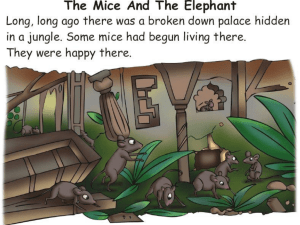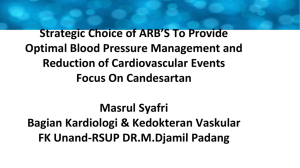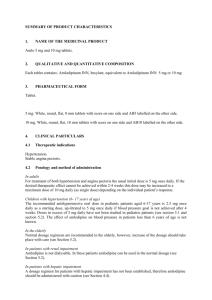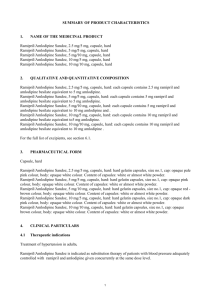Pharmacological Nephroprotection in a Novel Mouse Model
advertisement
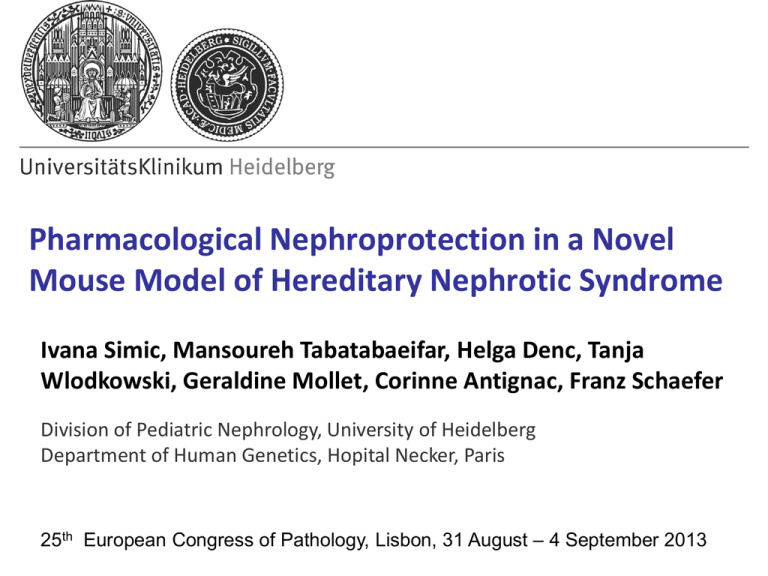
Pharmacological Nephroprotection in a Novel Mouse Model of Hereditary Nephrotic Syndrome Ivana Simic, Mansoureh Tabatabaeifar, Helga Denc, Tanja Wlodkowski, Geraldine Mollet, Corinne Antignac, Franz Schaefer Division of Pediatric Nephrology, University of Heidelberg Department of Human Genetics, Hopital Necker, Paris 25th European Congress of Pathology, Lisbon, 31 August – 4 September 2013 The NPHS2 Gene and Hereditary Nephrotic Syndrome • Mutations in the NPHS2 gene, encoding podocin, cause autosomal recessive steroid-resistant nephrotic syndrome • R138Q, the most common podocin mutation in Europeans, causes early disease onset and rapid progression to end-stage renal disease • Recently, we generated and characterized an inducible knockin mouse carrying the R140Q podocin mutation, the murine analogue of the most common human mutation R138Q N-term C-term R138Q Creation of a Conditional Knock-in Mouse Model of R140Q Mutation Bl6 X Nphs2R140Q/+ Cre Bl6 Cre Nphs2lox2/lox2 Cre+/+ Cre Nphs2lox2/R140Q Cre+ Tamoxifen induction Nphs2R140Q/Cre Prophylactic RAS Blockade in a Conditional Knock-in Mouse Model of R140Q Mutation Tamoxifen-induced mice received 10 mg/kg/day of: • ACE inhibitor Ramipril (R) • AT1 receptor blocker Candesartan (C) • the combination of Ramipril and Candesartan (R+C) • non-RAS antihypertensive amlodipine (A) Control groups: • Tamoxifen induction (sick controls) • Vehicle injections (healthy controls) Blood Pressure Effect of RAS Antagonists vs. Amlodipine 120 MABP (mmHg) 100 80 ** * ** *** *** *** ** *** *** *** *** *** *** *** 60 40 20 0 1 2 3 Week of observation healthy * p<0.05; ** p<0.01; *** p<0.001 untreated Ramipril Candesartan 4 C+R Amlodipine Markedly Attenuated Proteinuria in Podocin R140Q Knock-In Mice Treated with RAS Antagonists Normoalbuminemia in Podocin R140Q Knock-In Mice Treated with RAS Antagonists * p<0.05; ** p<0.01; *** p<0.0001 Reduced Plasma Creatinine Levels in All Treated Animals Subtotal Loss of Podocin Protein in All Induced Animals Irrespective of Pharmacological Treatment 4 WKS Control R C R+C A kDa 37 37 Podocin GAPDH The Loss of Podocin Signal at Immunofluorescence Analysis healthy untreated R+C Amlodipine Preserved Podocin mRNA Expression in All Induced Animals Podocin expression (% 18S) 3000 * 2500 2000 1500 1000 500 0 healthy sick Ramipril Candesartan Type of treatment * p>0.05 comparing to both sick untreated and healthy animals R+C Amlodipine Attenuated Glomerulosclerosis in Animals Treated with RAS Antagonists A. Glomerular sclerosis index 1,80 1,60 * 1,40 ** 1,20 *** **** 1,00 0,80 B. 0,60 0,40 0,20 0,00 healthy untreated Ramipril Candesartan R+C Amlodipine Type of treatment * p>0.05; ** p<0.05; *** p<0.01; **** p<0.001 PAS staining of renal tissue in induced animals: A. Untreated (notable GS); B. Mice treated with R+C. Insignificantly Attenuated Tubulointerstitial Fibrosis in Animals Treated with RAS Antagonists A. Area affected by fibrosis (% of total kidney area) 10,00 p>0.05 9,00 8,00 7,00 6,00 5,00 B. 4,00 3,00 2,00 1,00 0,00 healthy untreated Ramipril Candesartan R+C Amlodipine Type of treatment Sirius-Red-staining: A. Untreated animals; B. Mice treated with R+C. Improved Podocyte Survival in Animals Treated with RAS Antagonists Podocyte number (per glomerulus) A. 120 * 100 ** *** ** 80 B. 60 40 20 0 healthy untreated Ramipril Candesartan R+C Amlodipine Type of treatment * p<0.05; ** p<0.01; *** p<0.001 WT1 immunostaining of glomeruli of induced mice: A. Untreated (reduced podocyte number); B. Treated with R+C. Summary • RAS antagonists markedly attenuate proteinuria in mice hemizygous for podocin R140Q mutation • After 4 weeks, mice receiving R+C were normo-albuminemic and serum creatinine was increased less than in untreated or animals treated with Amlodipine • Reduced glomerulosclerosis and better podocyte survival in animals treated with RAS antagonists • RAS blockade provides effective pharmacological nephroprotection in this hereditary podocytopathy model Dr. Ivana Simic Dr. Mansoureh Tabatabaeifar Tanja Wlodkowski Dr. Helga Denc Prof. Dr. Franz Schaefer Hopital Necker, France Dr. Geraldine Mollet Prof. Dr. Corinne Antignac
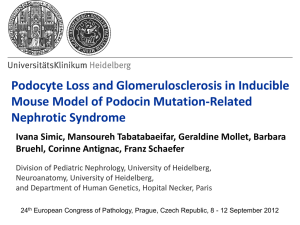
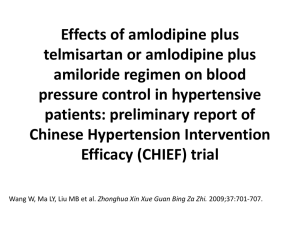
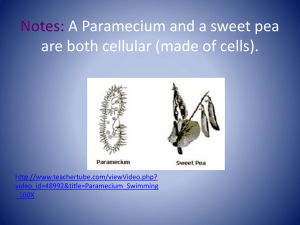

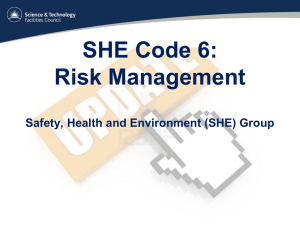
![Historical_politcal_background_(intro)[1]](http://s2.studylib.net/store/data/005222460_1-479b8dcb7799e13bea2e28f4fa4bf82a-300x300.png)


